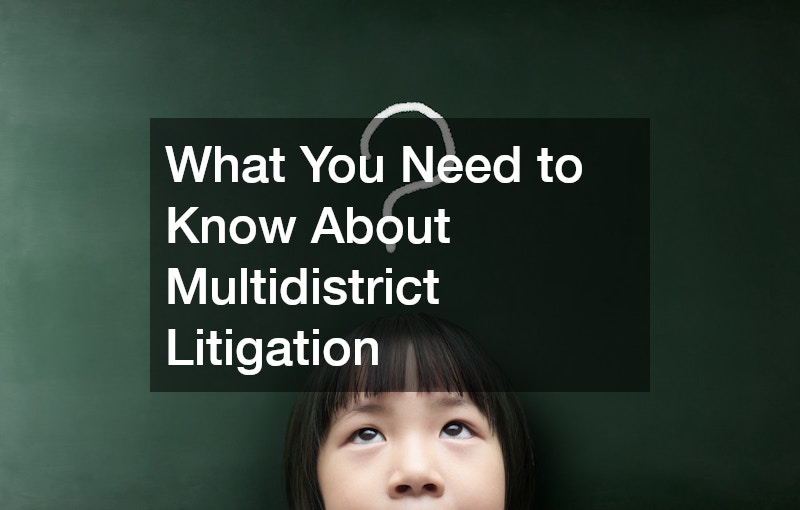
What You Need to Know About Multidistrict Litigation
When multiple lawsuits share common issues, courts may combine them into a single proceeding, known as multidistrict litigation. This process streamlines legal proceedings, prevents inconsistent rulings, and conserves judicial resources. A commercial lawyer can help businesses navigate these cases effectively and ensure compliance with procedural requirements.
Also known as consolidated litigation, it’s commonly used in complex legal disputes, such as large-scale consumer claims, mass torts, and corporate lawsuits. By grouping cases with similar legal and factual issues, courts can manage them more efficiently. This system benefits both plaintiffs and defendants by reducing redundant litigation efforts.
Why Cases Are Consolidated
Courts consolidate cases when multiple plaintiffs file similar claims against the same defendant. This often happens in commercial disputes where companies face allegations related to defective products, financial fraud, or contract breaches. By grouping these cases, the legal system avoids repetitive litigation and speeds up resolution.
Common reasons for case consolidation include:
- Similar Legal Issues: Cases involving identical or highly similar legal questions can be handled more effectively together.
- Efficiency and Cost Reduction: Consolidation reduces litigation expenses for all parties by limiting duplicate filings and court proceedings.
- Avoiding Conflicting Judgments: When different courts handle similar cases separately, they may reach inconsistent rulings. Consolidated litigation ensures a unified approach.
The Role of a Commercial Lawyer
A commercial lawyer plays a crucial role in multidistrict litigation by managing legal strategy and protecting client interests. They analyze claims, negotiate settlements, and advocate in court if necessary. Their expertise ensures businesses comply with legal requirements while minimizing risks in commercial litigation.
Commercial lawyers also assist in:
- Reviewing case details and advising clients on the best course of action.
- Coordinating with multiple parties, including co-defendants and plaintiffs.
- Crafting legal arguments to defend against liability claims.
Key Benefits of Consolidated Litigation
One of the biggest advantages of consolidated litigation is efficiency. Instead of handling numerous individual lawsuits, courts can resolve similar claims in a single process. This approach reduces costs, shortens timelines, and increases consistency in legal decisions.
Other key benefits include:
- Streamlined Discovery Process: Evidence collection, depositions, and document review are conducted more efficiently.
- Predictable Outcomes: A single judge handling multiple cases ensures more consistent rulings.
- Encouraging Settlements: Since all parties are involved in a unified legal process, settlements are often reached faster.
Challenges in Consolidated Litigation
Despite its benefits, consolidated litigation comes with challenges, such as managing large amounts of evidence and coordinating multiple parties. Defendants may also face increased financial exposure due to the sheer number of claims involved. A skilled commercial lawyer helps businesses navigate these complexities and develop a solid defense strategy.
Additional challenges include:
- Loss of Individual Control: Plaintiffs may have less influence over their specific case when it becomes part of a larger group.
- Delays in Resolution: While the goal is efficiency, complex cases may still take years to resolve.
- Increased Settlement Pressure: Defendants may feel pressured to settle to avoid prolonged litigation risks.
How It Affects Businesses
Businesses involved in consolidated litigation often experience significant financial and reputational risks. A negative ruling can lead to substantial damages and impact future commercial operations. Proper legal representation is essential to mitigate potential losses and protect a company’s interests.
For businesses, consolidated litigation can mean:
- Higher legal fees due to prolonged proceedings.
- Disruptions in operations and potential loss of investor confidence.
- The necessity for proactive legal compliance to prevent future disputes.
The Link to Commercial Disputes
Many commercial disputes escalate to consolidated litigation when numerous parties claim similar damages. These disputes may involve product liability or contract disagreements. Understanding how the process works helps businesses prepare for potential litigation and seek favorable outcomes.
Businesses should be aware of the following legal areas where consolidation often occurs:
- Product Liability Cases: Defective products leading to multiple lawsuits are often consolidated.
- Financial Fraud and Securities Cases: Investors filing similar claims against companies for fraudulent practices.
- Antitrust and Consumer Protection Lawsuits: When businesses are accused of unfair competition or price-fixing.
Simplify Legal Proceedings with Multidistrict Litigation
Multidistrict litigation is a powerful tool that simplifies legal proceedings involving multiple plaintiffs with similar claims. While it offers efficiency and consistency, it also presents challenges. Businesses facing such cases should work with an experts like Judge Jose Lineras to navigate the complexities of commercial litigation successfully.
By understanding the benefits and risks of consolidated litigation, companies can better prepare for legal disputes and develop effective strategies to protect their interests.





